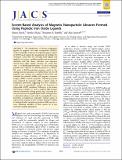Screen-Based Analysis of Magnetic Nanoparticle Libraries Formed Using Peptidic Iron Oxide Ligands
Author(s)
Barch, Mariya; Okada, Satoshi; Bartelle, Benjamin B.; Jasanoff, Alan Pradip
DownloadJasanoff_Screen-based.pdf (871.9Kb)
PUBLISHER_POLICY
Publisher Policy
Article is made available in accordance with the publisher's policy and may be subject to US copyright law. Please refer to the publisher's site for terms of use.
Terms of use
Metadata
Show full item recordAbstract
The identification of effective polypeptide ligands for magnetic iron oxide nanoparticles (IONPs) could considerably accelerate the high-throughput analysis of IONP-based reagents for imaging and cell labeling. We developed a procedure for screening IONP ligands and applied it to compare candidate peptides that incorporated carboxylic acid side chains, catechols, and sequences derived from phage display selection. We found that only l-3,4-dihydroxyphenylalanine (DOPA)-containing peptides were sufficient to maintain particles in solution. We used a DOPA-containing sequence motif as the starting point for generation of a further library of over 30 peptides, each of which was complexed with IONPs and evaluated for colloidal stability and magnetic resonance imaging (MRI) contrast properties. Optimal properties were conferred by sequences within a narrow range of biophysical parameters, suggesting that these sequences could serve as generalizable anchors for formation of polypeptide–IONP complexes. Differences in the amino acid sequence affected T[subscript 1]- and T[subscript 2]-weighted MRI contrast without substantially altering particle size, indicating that the microstructure of peptide-based IONP coatings exerts a substantial influence and could be manipulated to tune properties of targeted or responsive contrast agents. A representative peptide–IONP complex displayed stability in biological buffer and induced persistent MRI contrast in mice, indicating suitability of these species for in vivo molecular imaging applications.
Date issued
2014-08Department
Massachusetts Institute of Technology. Department of Biological Engineering; Massachusetts Institute of Technology. Department of Brain and Cognitive Sciences; Massachusetts Institute of Technology. Department of Nuclear Science and EngineeringJournal
Journal of the American Chemical Society
Publisher
American Chemical Society (ACS)
Citation
Barch, Mariya, Satoshi Okada, Benjamin B. Bartelle, and Alan Jasanoff. “Screen-Based Analysis of Magnetic Nanoparticle Libraries Formed Using Peptidic Iron Oxide Ligands.” Journal of the American Chemical Society 136, no. 36 (September 10, 2014): 12516–12519. © 2014 American Chemical Society
Version: Final published version
ISSN
0002-7863
1520-5126